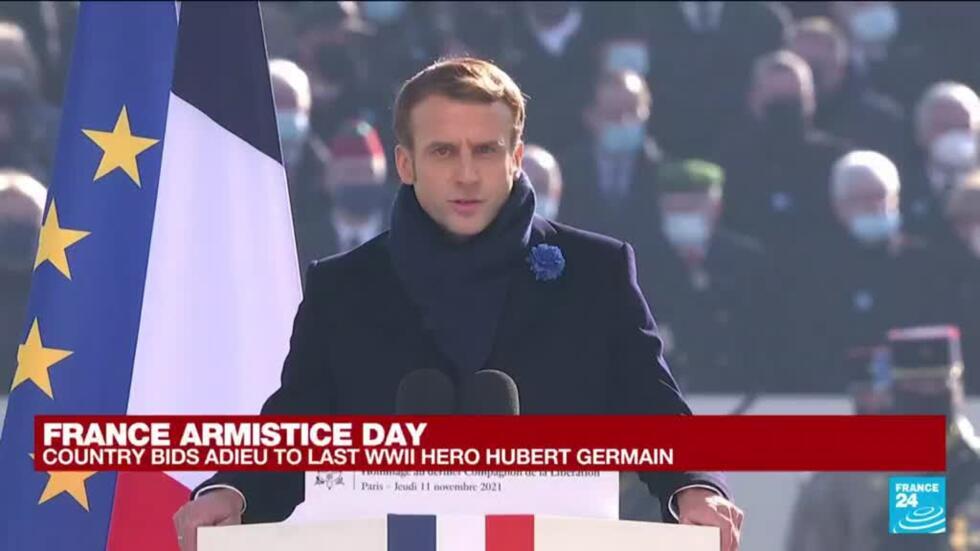Macron pays tribute to last French Resistance fighter on Armistice Day
President Emmanuel Macron led tributes on Thursday to the last French Resistance fighter from World War II who died last month and will be buried with a cross carved from the wood of Notre-Dame cathedral.
Issued on:

Hubert Germain, who was the last surviving Resistance fighter honoured by late Free France leader Charles de Gaulle, died aged 101 in October.
His coffin, draped in the French flag, was carried up the Champs-Élysées on an armoured vehicle to the Arc de Triomphe, where Macron and visiting US Vice President Kamala Harris paid their respects.
Germain, the son of a general in France's colonial army, was in his late teens when he fled to Britain after France's capitulation where he joined up with de Gaulle who was organising resistance to the German occupation. He went on to fight in key battles at Bir-Hakeim in Libya, at El Alamein in Egypt and in Tunisia, as well as in the invasion of German-occupied France in 1944 which liberated the country.
The Paris-born fighter was one of 1,038 people decorated with the Order of the Liberation for their heroism by de Gaulle, who would go on to become president of France and is the founder of the current constitution.
Germain, who became an MP and minister, will be buried later Thursday in a special crypt reserved for Resistance fighters at Mont Valérien, a former fortress west of Paris where German troops used to execute opponents.
At the Armistice Day ceremony Thursday, Macron laid a Cross of Lorraine, the symbol of the resistance, fashioned out of wood from Notre-Dame cathedral on his coffin, in accordance with Germain's wishes.

France holds a ceremony ever year at the Arc de Triomphe on Armistice Day, a public holiday to mark the armistice signed to end World War I.
'I am going to need you'
Germain was born in Paris on August 6, 1920, the son of a general officer who had served with France’s colonial forces. After graduating from high school, he was preparing for the entrance exam to the naval academy at the Lycée Michel Montaigne in Bordeaux when war was declared in September 1939. Months later, after May 1940 and the Fall of France, he decided to continue the fight.
Germain boarded a vessel transporting Polish soldiers to England and arrived in London on June 24, 1940. There he met De Gaulle. “After inquiring about my studies, he explained where he would send me to continue my training and told me, ‘I am going to need you’. Well, at 19, when the man who took the affairs of the nation into his hands tells you that, it puffs up your chest. I understood right away that, along with Churchill, De Gaulle and I were going to win the war!” he wrote in his autobiography.
Having joined the Free French Forces from their inception, Germain was assigned to the battleship Courbet where he studied to become a marine officer. In the spring of 1941 he was assigned to the staff of General Paul Legentilhomme, commander of the 1st Free French Division in Palestine, and slated to intervene in the Levant. He fought in Syria and Libya, where he saw combat at the Battle of Bir Hakeim, and in Egypt.
In Italy in May 1944, Germain, a lieutenant commanding an anti-tank section near Pontecorvo, sustained an injury to his side while supporting the attacking battalion along the Liri River with heavy artillery fire. Evacuated to Naples, Germain was decorated with the Cross of Liberation by De Gaulle at the end of June 1944. He later told of his astonishment in receiving the honour. “I never thought about that. I had fought hard, but I was never working with that in mind. It didn't interest me,” he said.
Germain took part in the Allied landing in Provence in August 1944. Four years after his departure for England, he finally set foot once again in his country. “You arrive on the land, you disembark, walk a few steps, and you collapse. It’s that land that inhales you, the beach. At that moment, you fall down on your knees and you weep. Not for long, because there is no time to lose, but it’s breathtaking,” he recalled during an interview with LCI television. “And it was then that I said to myself, ‘There, you have returned to France! France doesn’t belong to you, it is not your France’, but that night, it would be mine.”
(FRANCE 24 with AFP)
Daily newsletterReceive essential international news every morning
Subscribe